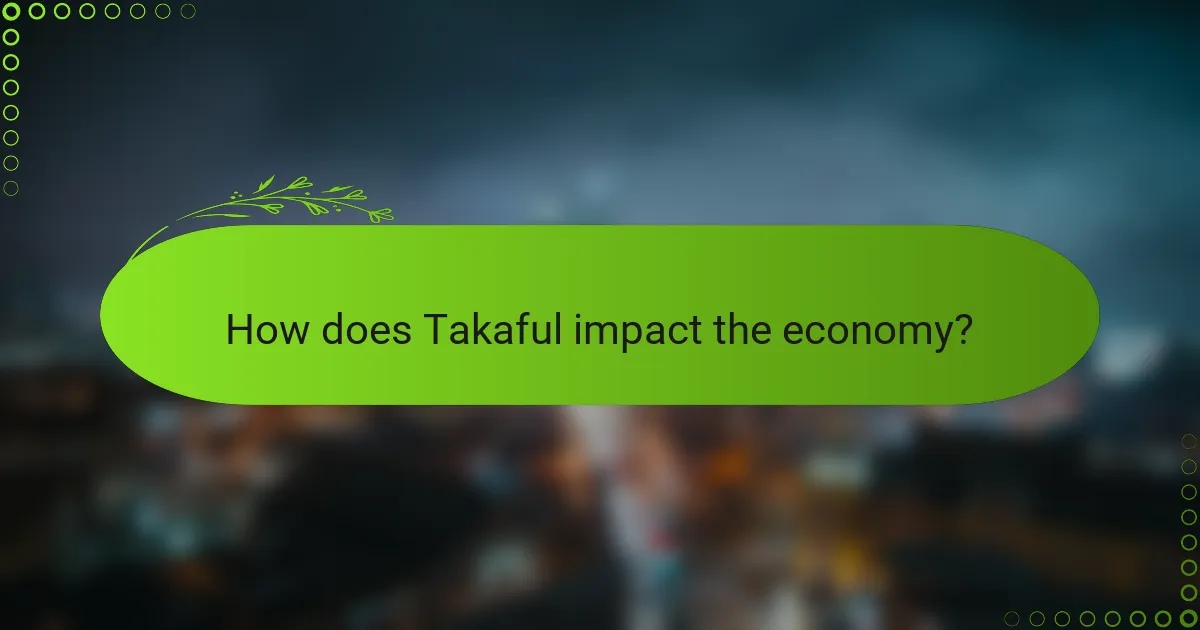
What is Islamic Insurance (Takaful)?
Islamic Insurance, or Takaful, is a cooperative system of insurance based on Islamic principles. It operates on the concept of mutual assistance, where participants contribute to a common fund. This fund is used to support members in times of need, such as illness or loss. Takaful is structured to avoid elements prohibited in [censured], such as interest (riba) and uncertainty (gharar). Instead, it emphasizes risk-sharing and ethical investments. The model promotes social responsibility and community welfare. Takaful has gained popularity in various regions, adhering to Shariah compliance. It serves as an alternative to conventional insurance, aligning financial practices with Islamic values.
How does Takaful differ from conventional insurance?
Takaful differs from conventional insurance primarily in its underlying principles. Takaful is based on mutual cooperation and shared responsibility among participants. In contrast, conventional insurance operates on risk transfer and profit maximization. Takaful participants contribute to a common pool to provide mutual assistance during claims. Conventional insurance companies, however, collect premiums and pay out claims based on contractual obligations. Additionally, Takaful adheres to Islamic law, prohibiting elements like gharar (uncertainty) and riba (interest). This compliance ensures ethical investment practices, unlike conventional insurance, which may invest in prohibited sectors.
What are the key principles of Takaful?
The key principles of Takaful include mutual cooperation, shared responsibility, and ethical investment. Takaful operates on the concept of participants pooling their resources to provide financial support to one another in times of need. This cooperative model ensures that risks are shared among participants rather than being transferred to an insurer. Each participant contributes to a fund, which is used to pay claims for those who experience loss.
Another principle is the prohibition of uncertainty (Gharar) and gambling (Maisir) in contracts. Takaful contracts must be clear and transparent to avoid ambiguity. Additionally, Takaful emphasizes social solidarity and community support. This principle encourages participants to assist each other, fostering a sense of belonging and mutual aid. Takaful also adheres to Shariah compliance, ensuring that all operations align with Islamic law.
These principles collectively promote a sustainable and ethical approach to insurance, contrasting with conventional insurance models.
How is risk shared within a Takaful framework?
Risk is shared within a Takaful framework through mutual cooperation and collective responsibility among participants. Each participant contributes to a common pool, which is used to support members facing losses. This pooling of resources allows for risk mitigation among the group. The contributions are based on the principle of solidarity, where members agree to assist one another in times of need. Takaful operates without profit motives, focusing instead on mutual aid. The shared risk is managed according to Shariah principles, ensuring ethical compliance. This framework promotes social welfare and financial stability within the community.
What are the economic implications of Takaful?
Takaful has significant economic implications by promoting risk sharing and financial inclusion. It fosters community cooperation and solidarity among participants. Takaful operates on principles of mutual assistance, which can enhance social welfare. This system can lead to increased savings and investments within communities. Research indicates that Takaful can stimulate economic growth by providing funding for various sectors. For instance, a study by the Islamic Financial Services Board highlights Takaful’s role in enhancing financial stability. Additionally, Takaful can help mitigate the financial burden of unexpected events, contributing to overall economic resilience.
How does Takaful contribute to financial inclusion?
Takaful contributes to financial inclusion by providing accessible insurance solutions to underserved populations. It operates on principles of mutual cooperation and shared responsibility. This model allows individuals from various income levels to participate in risk-sharing. Takaful eliminates barriers often associated with conventional insurance, such as high premiums and complex terms.
According to the Islamic Financial Services Board, Takaful has expanded access to financial services in many developing regions. It encourages savings and investment among participants. This further promotes economic stability and resilience within communities. Additionally, Takaful products are often aligned with ethical values, appealing to those seeking socially responsible financial options.
What role does Takaful play in community development?
Takaful plays a significant role in community development by promoting mutual assistance and financial inclusion. It operates on the principles of shared responsibility and cooperation among participants. This system allows individuals to pool their resources to support one another in times of need. Takaful funds can be used for community projects, health initiatives, and educational programs. This fosters social cohesion and economic stability within the community. Historical evidence shows that Takaful has contributed to poverty alleviation in various regions. For example, studies indicate that Takaful schemes have successfully funded local development projects in Malaysia and the Middle East.

How does Takaful impact the economy?
Takaful positively impacts the economy by promoting financial inclusion and stability. It provides a risk-sharing mechanism that enhances community welfare. Takaful encourages savings and investment among participants. This leads to increased capital availability for economic development. The global Takaful market was valued at approximately $25 billion in 2020, showing significant growth potential. By adhering to Sharia principles, Takaful fosters ethical investment practices. This alignment with social values can attract more participants and investors. Overall, Takaful contributes to a more resilient financial system.
What are the macroeconomic effects of Takaful?
Takaful has significant macroeconomic effects, particularly in enhancing financial stability and promoting risk-sharing. It contributes to economic growth by mobilizing savings and investments within communities. Takaful promotes social welfare through community support and mutual assistance, reducing the burden on government welfare systems. The sector generates employment opportunities within the insurance and financial services industries. Takaful also encourages ethical investments, aligning with Shariah principles, which can lead to sustainable economic practices. Additionally, it fosters financial inclusion by providing insurance products to underserved populations. These effects collectively enhance overall economic resilience and stability.
How does Takaful influence savings and investments?
Takaful influences savings and investments by promoting a cooperative risk-sharing model. This model encourages individuals to save collectively for mutual benefit. Participants contribute to a pool, which is then invested in Sharia-compliant ventures. This investment approach generates returns that benefit all participants. Takaful also fosters financial discipline among participants, as regular contributions are necessary. Additionally, it provides a safety net, reducing the financial burden in times of need. Studies indicate that Takaful can enhance financial inclusion by offering accessible insurance solutions. This, in turn, can lead to increased economic stability and growth in communities.
What is the impact of Takaful on job creation?
Takaful positively impacts job creation by promoting economic participation and entrepreneurship. Takaful companies require a workforce for operations, leading to direct job opportunities. The growth of Takaful also stimulates related sectors, such as finance and legal services, creating indirect jobs. According to a report by the Islamic Financial Services Board, the Takaful industry has expanded significantly, contributing to employment growth in various regions. This industry fosters skills development through training programs, enhancing workforce capabilities. Overall, Takaful acts as a catalyst for job creation within the economy.
What are the challenges faced by Takaful in the economy?
Takaful faces several challenges in the economy. One major challenge is regulatory compliance. Takaful operators must adhere to both Islamic law and local regulations. This dual requirement can complicate operational processes. Another challenge is market awareness. Many consumers lack understanding of Takaful products compared to conventional insurance. This leads to lower adoption rates. Additionally, Takaful operators face competition from conventional insurance companies. These companies often have established market presence and brand recognition. Furthermore, investment limitations pose a challenge. Takaful funds must invest in Sharia-compliant assets, which can restrict growth opportunities. Lastly, economic fluctuations can impact Takaful’s financial stability. Economic downturns may lead to increased claims and reduced contributions.
How do regulatory frameworks affect Takaful operations?
Regulatory frameworks significantly impact Takaful operations by establishing guidelines for compliance and governance. These frameworks ensure that Takaful providers adhere to Shariah principles while operating within legal boundaries. They dictate capital requirements, risk management practices, and operational transparency. Regulatory bodies often require regular audits and disclosures to protect participants’ interests. In regions with robust regulatory oversight, Takaful institutions tend to enjoy greater consumer trust and market stability. Studies indicate that effective regulation can enhance Takaful’s growth potential and market [censured]. For instance, the Islamic Financial Services Board (IFSB) provides standards that promote sound practices in Islamic finance, including Takaful.
What are the market competition challenges for Takaful providers?
Takaful providers face several market competition challenges. One major challenge is the lack of awareness about Takaful products among potential customers. This limits market [censured] and growth. Additionally, Takaful providers compete with conventional insurance companies that have established brand recognition and customer trust. Pricing strategies also pose a challenge, as Takaful providers must balance competitive pricing while maintaining financial viability. Regulatory compliance adds another layer of complexity, as Takaful providers must navigate different legal frameworks. Furthermore, the diversity of customer needs requires Takaful providers to offer tailored products, which can strain resources. Lastly, technological advancements in the insurance sector necessitate continuous innovation, putting pressure on Takaful providers to adapt quickly.

What are the future prospects of Takaful?
The future prospects of Takaful are promising due to increasing demand for Sharia-compliant financial products. The global Takaful market is expected to grow significantly, driven by rising awareness of Islamic finance principles. According to a report by the Islamic Financial Services Board, the Takaful sector is projected to reach a market size of $40 billion by 2025. This growth is attributed to a larger Muslim population seeking ethical insurance solutions. Additionally, regulatory support in various countries enhances the industry’s potential. Technological advancements, such as digital platforms, are also facilitating easier access to Takaful products. These factors indicate a robust future for Takaful in the global insurance landscape.
How is technology shaping the future of Takaful?
Technology is transforming the future of Takaful by enhancing efficiency and accessibility. Digital platforms streamline the enrollment process for participants. Mobile applications allow for real-time policy management and claims processing. Data analytics enable personalized product offerings based on user behavior. Blockchain technology improves transparency and trust in transactions. Artificial intelligence assists in risk assessment and fraud detection. These advancements lead to increased customer satisfaction and engagement. According to a report by PwC, the adoption of technology in Takaful can drive growth by 30% over the next decade.
What innovations are emerging in the Takaful industry?
Innovations in the Takaful industry include the integration of technology and digital platforms. These advancements enhance customer engagement and streamline operations. Artificial intelligence is being utilized for risk assessment and underwriting processes. Blockchain technology is improving transparency and efficiency in claims processing. Mobile applications are facilitating easier access to Takaful products for consumers. Data analytics is enabling personalized product offerings tailored to customer needs. Furthermore, partnerships with fintech companies are driving innovation in payment solutions. According to a report by Deloitte, the Takaful market is expected to grow significantly due to these technological advancements.
How can Takaful adapt to changing consumer needs?
Takaful can adapt to changing consumer needs by enhancing product offerings and improving customer engagement. This can be achieved through market research to identify emerging consumer preferences. Takaful providers should develop flexible plans that cater to diverse demographics. Incorporating technology can streamline processes and improve accessibility. Digital platforms can facilitate easier communication and claims processing. Additionally, Takaful can offer personalized services to meet individual customer requirements. Continuous education about Takaful’s benefits can increase consumer awareness and trust. By being responsive to feedback, Takaful can refine its services to align with consumer expectations.
What best practices can enhance the effectiveness of Takaful?
Best practices that can enhance the effectiveness of Takaful include clear communication of principles and benefits. This ensures that participants understand their roles in the mutual assistance model. Regular training for agents on Takaful concepts enhances their ability to explain products effectively. Transparency in operations builds trust among participants and stakeholders. Implementing robust risk management strategies minimizes potential losses and ensures sustainability. Regular feedback from participants can inform improvements in service delivery. Utilizing technology for claims processing can streamline operations and enhance customer satisfaction. Finally, adhering to Shariah compliance is essential to maintain the integrity of Takaful offerings.
How can Takaful providers improve customer engagement?
Takaful providers can improve customer engagement by leveraging technology and personalized communication. Implementing mobile apps enhances accessibility for customers. These apps can facilitate policy management and claims processing. Regular updates through these platforms keep customers informed. Personalized communication through emails and text messages fosters a stronger connection. Offering educational content about Takaful products builds trust and understanding. Engaging customers through social media platforms increases interaction. Surveys can gather feedback to refine services and address customer needs. Data analytics can identify customer preferences, enabling tailored offerings.
What strategies can be employed for better risk management in Takaful?
Effective risk management in Takaful can be achieved through several strategies. First, implementing a robust underwriting process is essential. This process assesses the risk profiles of participants accurately. Second, risk pooling among participants helps to distribute risks more evenly. This collective approach reduces the financial burden on individual members. Third, regular risk assessments and audits ensure that potential risks are identified and mitigated promptly. Fourth, employing re-Takaful mechanisms can further safeguard against large claims. This practice involves transferring some risks to other Takaful operators. Fifth, enhancing participant education about Takaful principles fosters better understanding and engagement. This leads to more informed decisions regarding coverage options. Lastly, leveraging technology for data analytics improves risk prediction and management strategies. These approaches collectively contribute to a more resilient Takaful framework.
Islamic Insurance, or Takaful, is a cooperative insurance model based on Islamic principles that emphasizes mutual assistance and ethical investments. This article explores the economic effects of Takaful, highlighting its role in promoting financial inclusion, community development, and risk-sharing among participants. Key principles such as adherence to Shariah compliance, the prohibition of interest and uncertainty, and the impact on savings, investments, and job creation will be discussed. Additionally, the article addresses the challenges faced by Takaful providers and the future prospects shaped by technological advancements and changing consumer needs.